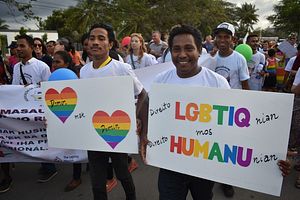DILI, TIMOR-LESTE – “This day means freedom,” says Domingos Gonsalves Barros as he waves a rainbow flag high above his head. “We can finally express ourselves without feeling intimidated by those people who bully us.”
Barros, a gay university student, is one of the 1,500 people who took part in Timor-Leste’s second-ever LGBTI Pride parade on July 20, 2018. Led by a transgender marching band and featuring modern dance performances, prayer groups, and stirring renditions of traditional Timorese resistance songs, the parade traced a colorful path through the capital city of Dili, a celebration of the lesbian, gay, bisexual, transgender, and intersex (LGBTI) community.
“Visibility is important,” says Natalino Guterres, the slight, 28-year-old activist who orchestrated the event, as well as Timor-Leste’s first Pride parade in 2017. “Many LGBTI get bullied, threatened, harassed, so it’s meaningful for them to go out on the street and feel safe, proud to be themselves.”
“And on the other side, for them to wear dresses, makeup, wigs – it was probably shocking for some people,” he says. “But I think it’s good; it’s the start of a conversation that isn’t happening in this country.”
Timor-Leste has attracted international attention in recent years for its increasingly vocal LGBTI community. The half-island nation is considered a bright spot when it comes to LGBTI rights in Southeast Asia, compared to recent crackdowns against such individuals in Indonesia and Malaysia.
Timor-Leste’s reputation as a leader on LGBTI issues is perhaps surprising given the country’s religious makeup and recent troubled history. The country, which was a Portuguese colony until 1975, remains one of the most Catholic countries in the world. Ninety-seven percent of Timorese describe themselves as Catholic. Timor-Leste gained de facto independence in 2002 after a bloody decades-long struggle against its Indonesian occupiers, only to collapse into a quasi-civil war between 2006 and 2008.
Nevertheless, Bella Galhos, a former independence activist who, along with Guterres, has become a symbol of the nascent LGBTI movement, cautions against accepting at face value the international community’s designation of Timor-Leste as a safe haven.
“Let’s not dramatize the situation,” she says flatly. “We are still struggling.”






























